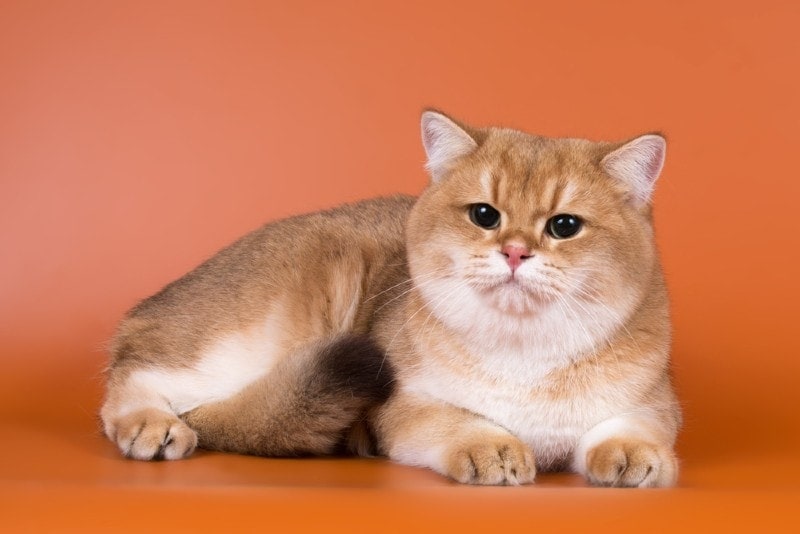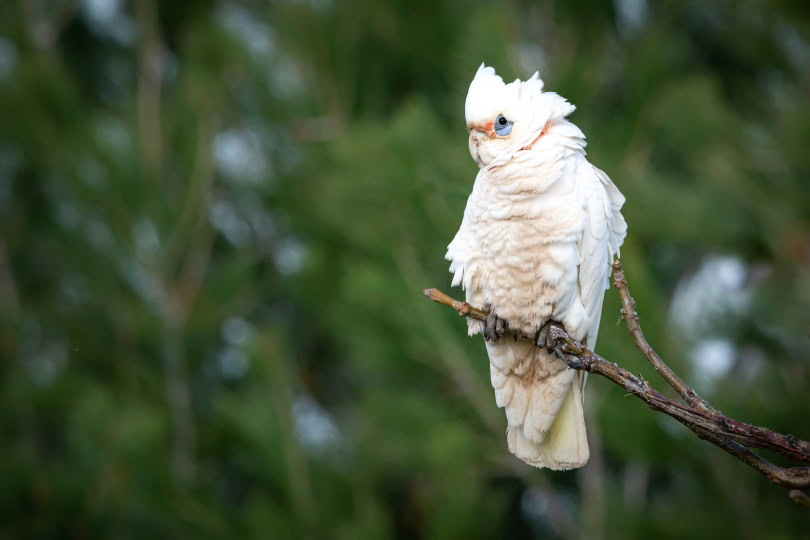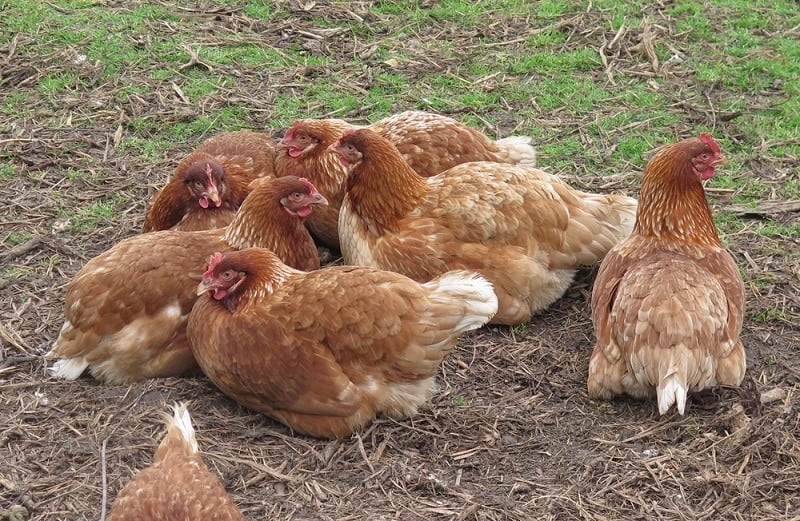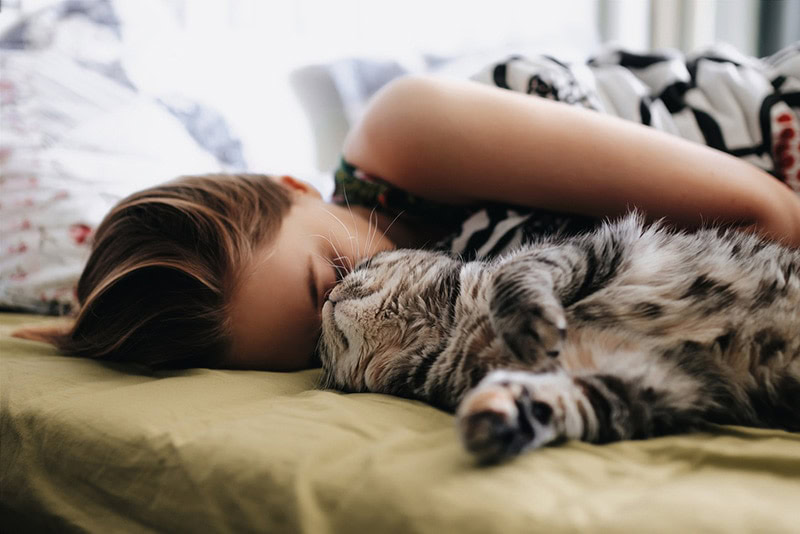Click to Skip Ahead
Golden British Shorthair cats have gorgeous, orange-colored fur along with the famous laid-back personalities shared by most members of the breed. Although many people associate the cats with gray or blue coats, British Shorthair cats come in several shades and patterns, including golden, white, cream, black, bicolor, and tabby patterns.
Breed Overview
Height:
12–14 inches
Weight:
7–18 pounds
Lifespan:
13–15 years
Colors:
Golden, lilac, cinnamon, chocolate, cream, blue, and silver
Suitable for:
Families and singles looking for a calm, quiet cat
Temperament:
Intelligent, calm, quiet, independent, and friendly
British Shorthair cats typically make wonderful companions that are usually happiest when hanging out with their humans. These large cuddly cats can weigh up to 17 pounds and grow to lengths of 25 inches!
Golden British Shorthair Characteristics

The Earliest Records of British Shorthair Cats in History
The ancestors of British Shorthairs most likely accompanied the Romans to the British Isles, where they were used for pest control. While they started as working cats, they soon became popular companion animals commonly in homes and farms around Britain.
They were essentially street cats until Harrison Weir, a major player in the emerging cat fancy world, began advocating for them to be considered a distinct breed in the late 1800s. Breeders mixed British Shorthair cats with Persian cats during the early 20th century to create British longhair kitties. Long-haired versions resemble early 20th-century Persian and Angora cats.
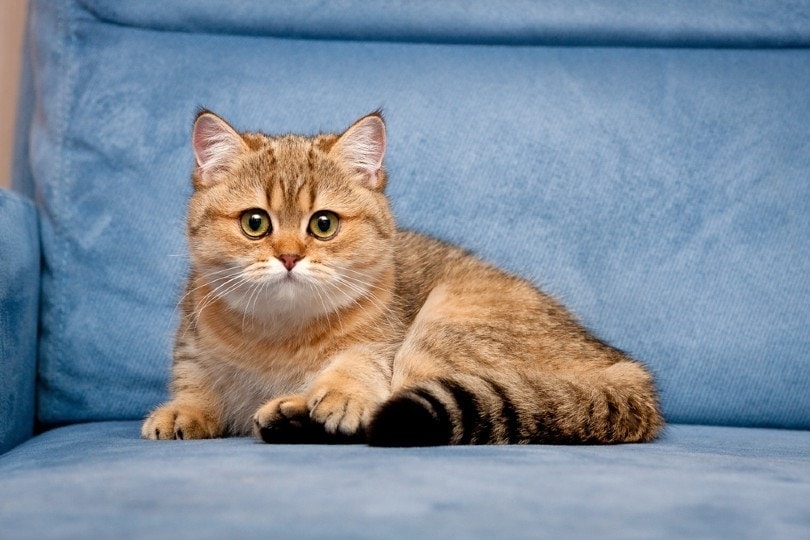
How British Shorthair Cats Gained Popularity
British Shorthairs gained popularity as a breed after participating in the first cat show in the UK organized by Harrison Weir in 1871. But after the turn of the century, interest in the breed began to decline. WWII was particularly hard on British Shorthair cats. But the breed made a comeback after the war thanks to breeders introducing domestic Shorthair, Persian, and Russian blue cats to the gene pool.
After arriving in the United States in the 1900s, British Shorthairs remained relatively obscure, but they gained popularity over time. In 2021, British Shorthair cats were the 6th most popular pedigree cats in the US, and they regularly make up around one-quarter of the cats registered each year with the Grand Council of the Cat Fancy (GCCF).
Formal Recognition of British Shorthair Cats
While British Shorthairs have been around for centuries, they were first identified as a breed in the late 1800s, when Harrison Weir began arguing that the street cats of Britain should be treated as a distinct breed. They were first shown as a breed at Weir’s 1871 Crystal Palace cat show, where one of Weir’s British Shorthair cats was named Best in Show.
British Shorthair cats were admitted to championship status by The International Cat Association (TICA) in 1979, and the Cat Fanciers’ Association (CFA) first recognized the breed in 1980. TICA acknowledged the long-haired siblings of these cats in 2009.
One named Brynbuboo Little Monarch was the GFCC’s first adult grand champion1. In 1988, the CFA named a British Shorthair cat the third-best Cat in Premiership.

Top 5 Unique Facts About the British Shorthair Cat
1. Orange Tabby British Shorthair Cats are Likely to Be Male
Around 80% of orange tabby cats are male, including orange tabby British Shorthair kitties. The orange gene is on feline X chromosomes. Male cats only have one X chromosome, so it’s statistically easier for males than females to turn out a gorgeous fiery shade of orange.
2. British Shorthair Cats Often Have Weight Issues
These handsome cats are generally on the large side; some large males weigh as much as 17 pounds. However, the breed tends to gain weight, and British Shorthair cats often suffer from obesity. Weight problems are often difficult to identify since they have stocky, almost chubby physiques when healthy.
3. A British Shorthair Cat Held the Record for the Loudest Purr
In 2016, the Guinness Book of World Records recognized Smokey, a rescued British Shorthair, as having the loudest purr on earth! Smokey’s purr reached a whopping 67.7 dB. Normal conversations register at around 60 dB.
4. They’re Cultural Icons
These kitties are worldwide cultural icons and have been for quite some time. Lewis Carroll may have based Alice in Wonderland‘s Cheshire Cat on a British Shorthair kitty. In Hong Kong, cat lovers fell in love with Brother Cream, a British Shorthair cat who gained fame after disappearing. He returned home after a few weeks and became a celebrity. The handsome cats have also appeared in advertisements for companies such as Prada and Whiskas.
5. Some Don’t Like to Be Held
Although British Shorthairs are loving and prefer to be around their people, many don’t relish being picked up! Many happily play in the room where their humans are working or watching TV but prefer not to be picked up and carried from place to place.

Do Golden British Shorthair Cats Make Good Pets?
Golden British Shorthair cats make incredibly good pets. They are friendly, easy to care for, and relaxed. Most enjoy being around people and are perfectly content when napping or playing in the same room as their favorite humans.
They make great apartment cats since they aren’t hyper or prone to excessive vocalization. While they require exercise, most are usually okay with a few daily play sessions. They don’t have any special dietary requirements but, like all cats, do best when eating high-quality cat food that meets American Association of Feed Control Officials (AAFCO) nutritional guidelines. They don’t require much in the grooming department, just a quick brushing once a week or so. Regular tooth brushing and nail clipping are also required.


Conclusion
Golden British Shorthair cats are friendly, relaxed, and loving pets. Between their sweet personalities and adorable chubby faces, they are incredibly easy to love. There are several reasons why these street-cat descendants are consistently some of the most popular cats in the UK and the US! They’re easy to care for, mellow, and make wonderful pets.
- https://www.tica.org
- https://en.wikipedia.org
- https://cfa.org
- https://bellacats.com
- https://www.dutch.com
- https://www.psychologytoday.com
- https://en.wikipedia.org
- https://www.ncbi.nlm.nih.gov
- https://excitedcats.com
- https://www.litter-robot.com
- https://www.gccfcats.org
- https://www.petmd.com
- https://www.dailymail.co.uk
- https://www.dutch.com
- https://www.litter-robot.com
- https://www.thesprucepets.com
- https://www.dailypaws.com
- https://paradepets.com
- https://blog.feliway.com
- https://vcahospitals.com
Featured Image Credit: OksanaSusoeva, Shutterstock
